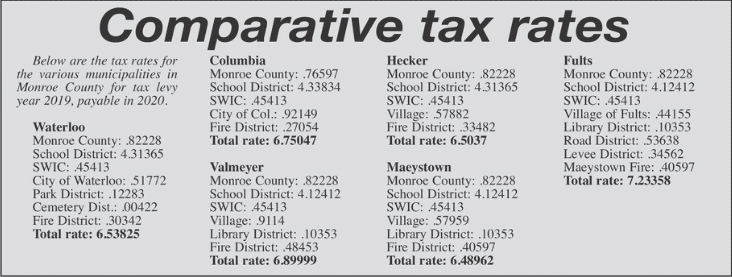Tax bill breakdown
The coronavirus pandemic has slowed much of the world down, but Monroe County residents should actually receive their real estate tax bills about two weeks earlier than last year.
The bills are in the mail or already delivered after being printed at MAR graphics in Valmeyer.
Monroe County will collect $62,949,817.62 from 2019’s property taxes, which is up 3.6 percent or $2,188,207.90 from last year’s total.
“The normal inflation rate plus new growth in the county increased the total tax amount,” Monroe County Treasurer Kevin Koenigstein explained.
Monroe County is a Property Tax Extension Limitation Law county, which means many of its taxing districts can only raise taxes by the rate of inflation unless they get the OK from voters to increase them more like the Valmeyer Fire District recently did, Koenigstein also stressed.
Overall tax rates remained relatively steady or slightly decreased in most of the county, but the amount of taxes collected still increased because the total assessed value rose.
“The overall assessed values increased in the county by $49,417,837 or 5.54 percent, and thus rates decreased to collect the requested amount by the taxing district,” Koenigstein said. “Farmland assessments climbed 10-15 percent.”
Monroe County’s multiplier is also slightly lower than last year’s of 1.0451. This year, the multiplier is 1.0319.
The multiplier is used to achieve uniform property assessments among counties as required by law. It compares the sales price of individual properties sold over the last three years to the assessed value of those properties.
The multiplier is applied to all 18,366 taxable parcels of land in Monroe County. There are 19,585 total parcels, but over 1,000 of those are tax exempt organizations like churches, cities and schools.
Depending on where residents live, real estate taxes help fund local schools, roads, fire departments, municipal responsibilities, county operations and more.
Monroe County, as a taxing body, will receive $7,208,284.94 this year, which is up .82 percent or $58,788.21 from last year.
The county’s tax rate this year is .82228, slightly lower than 2019’s .86178.
The other largest taxing bodies in the county are the various city governments and school districts.
The City of Waterloo will get $1,401,051.62, and the Waterloo School District will get $21,194,598.96.
The school district’s total tax revenue increased the most of any taxing body in Monroe County, as it is slated to get $1,173,236.93 more than the previous year.
Waterloo Superintendent of Schools Brian Charron pointed out that while the district is collecting more, its tax rate is actually about 3.5 cents lower than last year.
“I’m pleased that there is additional revenue generated, but I’m also pleased that our overall tax rate has gone down,” Charron said.
In Columbia, the city will get $2,708,730.64, while the school district will collect $15,361,483.27.
The Columbia School District’s tax revenue increased by $257,253.64.
For Valmeyer, the village will receive $193,581.56, and the school district will get $2,689,882.31.
The Valmeyer School District should get $70,659.40 more this year compared to last.
The first installment of the tax bill payments is due Sept. 25, and the second is due Nov. 6.
Individuals can pay online at monroecountyil.gov/departments/treasurers-office, via phone by calling 833-939-0897, by mail or in person at local banks.
Residents can also pay their bills early.
Due to the pandemic, however, the state requires any interest accrued by someone who does not make the first payment to be waived as long as they pay the total bill by the November deadline.
Even with that waiver, Koenigstein encouraged people to pay their taxes as soon as possible, though he acknowledged this could be tougher than usual given the financial difficulties caused by COVID-19.
“The taxing districts need their tax revenue to meet their operating needs,” he pointed out.
For more information on the real estate tax bills, call the Monroe County Treasurer’s Office at 939-8681, ext. 208.







